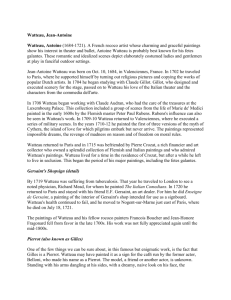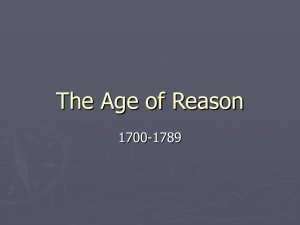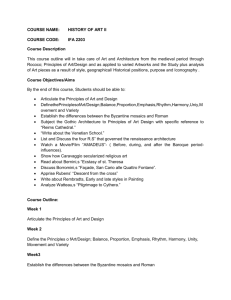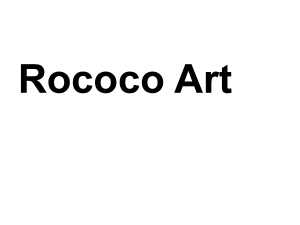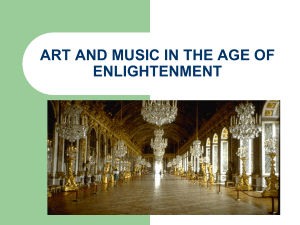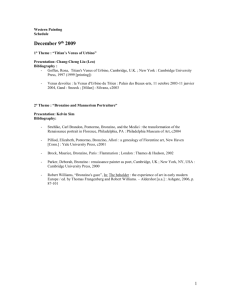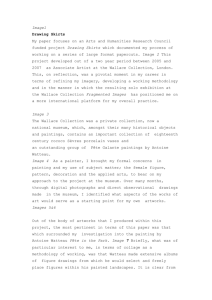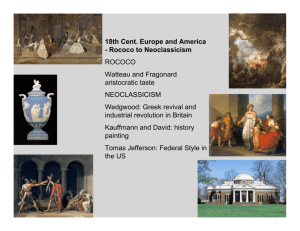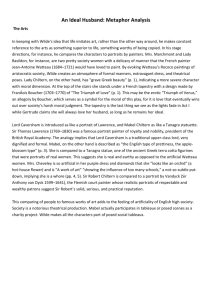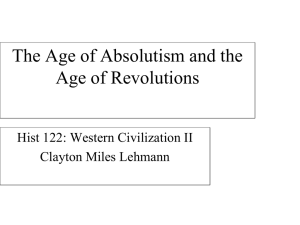27/28 May 2015 Josephine Touma
advertisement
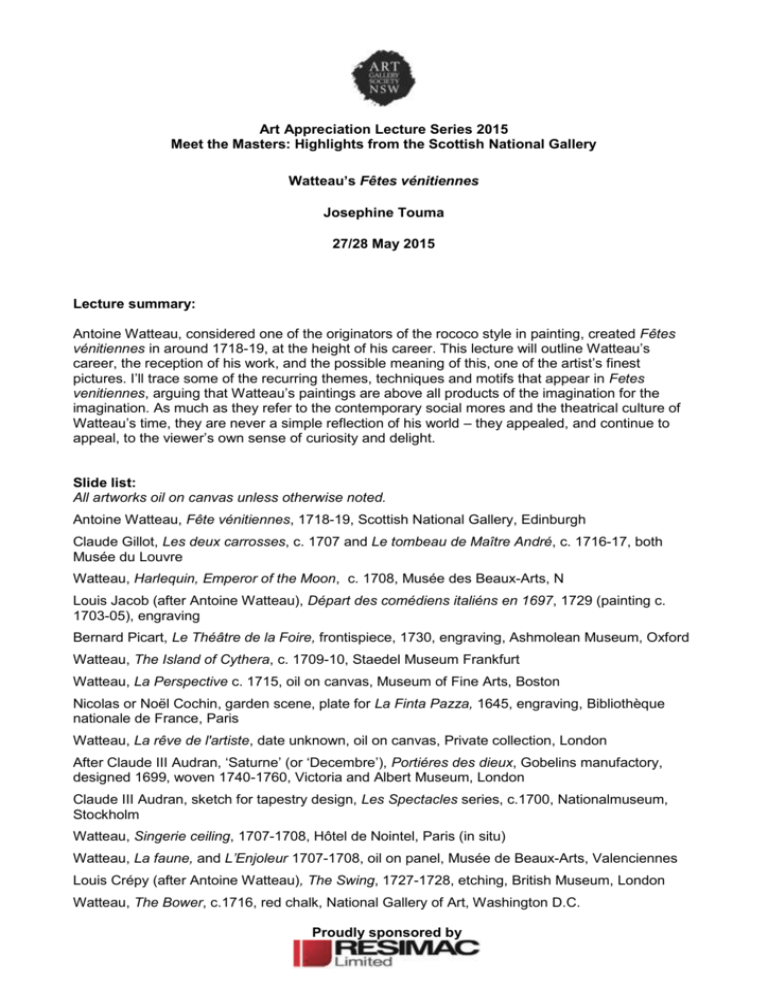
Art Appreciation Lecture Series 2015 Meet the Masters: Highlights from the Scottish National Gallery Watteau’s Fêtes vénitiennes Josephine Touma 27/28 May 2015 Lecture summary: Antoine Watteau, considered one of the originators of the rococo style in painting, created Fêtes vénitiennes in around 1718-19, at the height of his career. This lecture will outline Watteau’s career, the reception of his work, and the possible meaning of this, one of the artist’s finest pictures. I’ll trace some of the recurring themes, techniques and motifs that appear in Fetes venitiennes, arguing that Watteau’s paintings are above all products of the imagination for the imagination. As much as they refer to the contemporary social mores and the theatrical culture of Watteau’s time, they are never a simple reflection of his world – they appealed, and continue to appeal, to the viewer’s own sense of curiosity and delight. Slide list: All artworks oil on canvas unless otherwise noted. Antoine Watteau, Fête vénitiennes, 1718-19, Scottish National Gallery, Edinburgh Claude Gillot, Les deux carrosses, c. 1707 and Le tombeau de Maître André, c. 1716-17, both Musée du Louvre Watteau, Harlequin, Emperor of the Moon, c. 1708, Musée des Beaux-Arts, N Louis Jacob (after Antoine Watteau), Départ des comédiens italiéns en 1697, 1729 (painting c. 1703-05), engraving Bernard Picart, Le Théâtre de la Foire, frontispiece, 1730, engraving, Ashmolean Museum, Oxford Watteau, The Island of Cythera, c. 1709-10, Staedel Museum Frankfurt Watteau, La Perspective c. 1715, oil on canvas, Museum of Fine Arts, Boston Nicolas or Noël Cochin, garden scene, plate for La Finta Pazza, 1645, engraving, Bibliothèque nationale de France, Paris Watteau, La rêve de l'artiste, date unknown, oil on canvas, Private collection, London After Claude III Audran, ‘Saturne’ (or ‘Decembre’), Portiéres des dieux, Gobelins manufactory, designed 1699, woven 1740-1760, Victoria and Albert Museum, London Claude III Audran, sketch for tapestry design, Les Spectacles series, c.1700, Nationalmuseum, Stockholm Watteau, Singerie ceiling, 1707-1708, Hôtel de Nointel, Paris (in situ) Watteau, La faune, and L’Enjoleur 1707-1708, oil on panel, Musée de Beaux-Arts, Valenciennes Louis Crépy (after Antoine Watteau), The Swing, 1727-1728, etching, British Museum, London Watteau, The Bower, c.1716, red chalk, National Gallery of Art, Washington D.C. Proudly sponsored by Peter Paul Rubens, The Disembarkation at Marseilles (Marie de Medici cycle), c, 1622-25, Musée du Louvre Watteau, The Portal of Valenciennes, 1709-10, Frick Collection, New York After Watteau, Les Jaloux (the jealous ones), engraving Watteau, The pilgrimage to Cythera, 1717, Louvre Titian or Giorgione, Pastoral concert, c. 1510, Musee du Louvre David Teniers the Younger, Flemish Kermesse, 1652, Museum of Fine Arts, Brussels Peter Paul Rubens, The Garden of Love, 1633, Museo del Prado Watteau, Love in the French theatre, 1710s, oil on canvas, Gemäldegalerie, Berlin Watteau, Assembly in a park, c. 1716-17, Louvre Watteau, The faux pas, 1716-18, Louvre François Boucher (after Watteau), Portrait of Watteau, 1726, etching Nicolas Vleughels, Self-portrait, pastel, Musee du Louvre Edme Jeaurat after Antoine Pesne, Nicolas Vleughels, engraving, 1725 Watteau, Two studies of women, red chalk, New York, Woodner Collection Watteau, Studies of a man and woman, red, black and white chalk, Goethe Museum, Weimar Watteau, Two studies of a caped man, Louvre Watteau, Study of a dancer, red, black and white chalk, Musée du Petit Palais, Paris Watteau, Study of a seated woman, red, black and white chalk, private collection Watteau, Two studies of a musette player, red, black and white chalk Louvre Watteau, Gersaint’s Signboard, 1720-21, oil on canvas, Charlottenburg Palace, Berlin Reference: Julie Anne Plax, Watteau and the cultural politics of eighteenth-century France, Cambridge University Press, 2000 Donald Posner, Antoine Watteau, Cornell University Press, 1984 Pierre Rosenberg, ed. Vies Anciennes de Watteau. Paris: Hermann, 1984. Pierre Rosenberg and Louis-Antoine Prat. Antoine Watteau (1684-1721): Catalogue raisonné des dessins. 3 vols. Paris: Gallimard/Electa, 1996. Mary Vidal, Watteau’s Painted Conversations, Yale University Press, 1992 For access to all past lecture notes visit: http://www.artgallery.nsw.gov.au/members/current-members/member-events/meet-the-masters/
